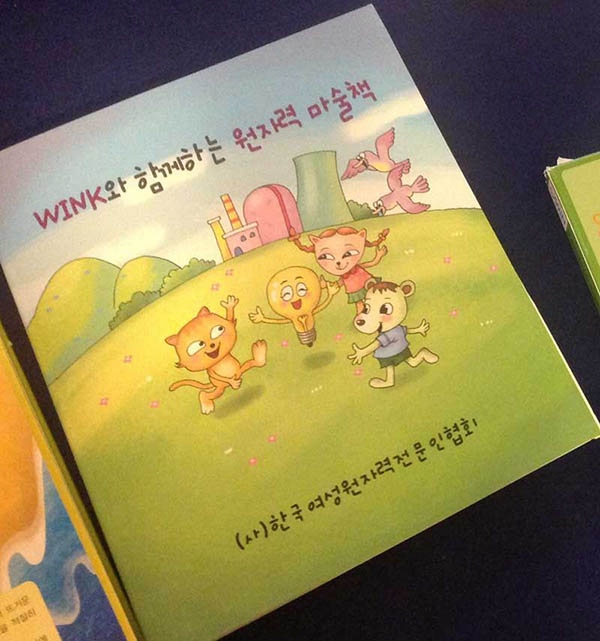Today’s post by Vincent Ialenti, a doctoral candidate in anthropology at Cornell, is in partnership with the experimental publication Allegra Lab, and links reflections on the theme of #pragmatism to anthropological research on nuclear energy and environmentalism. Pragmatism, according to Merriam-Webster, refers to both “a practical approach to problems and affairs,” and an American philosophical tradition, founded by C. S. Peirce and William James, that evaluates conceptions and thought through their practical consequences in guiding action. — Editor’s note.

The Magic Book for Nuclear Power. Image by author.
This is a picture of a brightly colored South Korean pro-nuclear children’s book adorned with friendly animals dancing around a light bulb in front of a nuclear power plant. The title translates to The Magic Book for Nuclear Power with WINK (Women In Nuclear-Korea). I first encountered this artifact in London at a 2013 World Nuclear Association symposium. There, it was a tool nuclear energy industry insiders used to counter what they saw as anti-nuclear misinformation to which Korean children might be exposed through television, from their parents, or at school.
At the time, I associated the book with rising “climate pragmatist” pro-nuclear environmentalisms like those in Robert Stone’s Pandora’s Promise documentary, those of Breakthrough Institute thinkers, those of the Hartwell Group, or—more recently—those in the Ecomodernist Manifesto. These pragmatisms were underlain by hopes for technology, innovation, human agency, open futures, incremental progress, and possibilities for achieving common ground across political divides. I continue to reflect on these pragmatisms as I develop an ethnography of Finland’s deep time auguring Olkiluoto nuclear waste repository safety case experts.
The Magic Book has since been enchanted with many new layers of meaning, complexity, and ambiguity for me thanks to Amy Levine’s interesting work on nuclear energy job markets, intergenerational change, and democratic transition in South Korea. Levine’s new book South Korean Civil Movement Organizations: Hope, Crisis & Pragmatism in Democratic Transition is a careful analysis of civil society and social movements in “post-colonial, post-Cold War, post-dictatorship, and post-IMF neoliberal democracy” South Korea. It has provided me with rich socio-historical context for pondering how The Magic Book might be received by the Korean publics for which it was written.
I now reflect on how the The Magic Book might evoke negative domestic imageries of “nuclear mafia” collusions among South Korean technocrats, government officials, finance insiders, and nuclear energy leaders. I think about how it could be received with skepticism by wary post-Sewol post-Fukushima publics. And I ponder parallels between global pro-nuclear climate pragmatisms and longstanding South Korean prizings of pragmatism’s (siryongjuui) virtues.
But the most illuminating insight in Levine’s book regards crisis. She has shown how evocations of pragmatism are so often grounded on imageries of ongoing crisis that pragmatism’s progressive momentum posits as its backdrop. This holds for pragmatic industry insiders in London responding to a nuclear energy “public acceptance crisis.” It holds for ecomodernists in the United States responding to climate crisis. And it holds for Levine’s South Korean intellectual, reformer, and activist informants. Subtle insights like these are the stuff of great ethnography.
This article is cross-posted at Allegra Laboratory‘s Virtual Museum of Obscure Fieldwork Artifacts.

1 Comment
One of the problems with South Korean society is the fact that while the country is technologically advanced, in many respects they still adhere to the Confucian model of civil society. As such, would could reasonably ask how strong an influence “a nuclear mafia” could be.